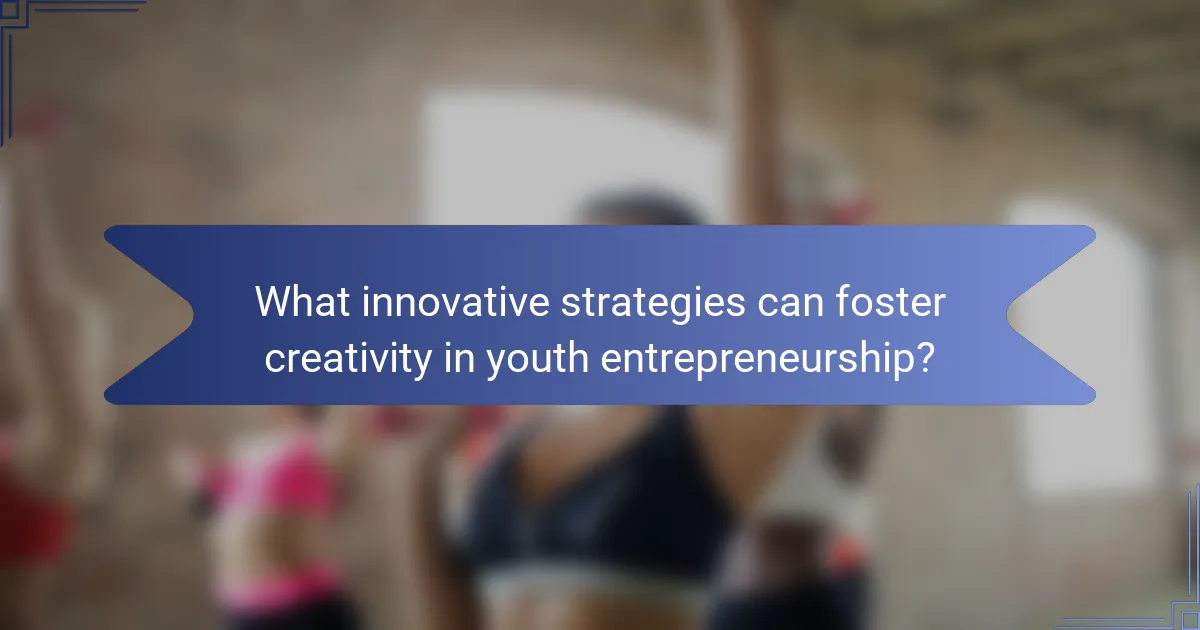Empowering youth entrepreneurship is crucial for fostering innovation and resilience in young minds. This article explores how psychological insights enhance self-efficacy and emotional intelligence, promote innovative thinking, and provide resilience training. It also highlights the importance of mentorship, hands-on workshops, and collaborative projects in nurturing essential entrepreneurial attributes. By integrating these strategies, young entrepreneurs can optimise their potential and navigate challenges effectively.

How can psychological insights empower youth entrepreneurship?
Psychological insights can significantly empower youth entrepreneurship by enhancing their mindsets, resilience, and innovation. These insights provide tools for overcoming challenges and fostering a growth-oriented perspective.
Understanding psychological principles helps youth develop crucial attributes such as self-efficacy and emotional intelligence. These attributes enable young entrepreneurs to navigate setbacks and maintain motivation. Research indicates that youth with high self-efficacy are more likely to pursue entrepreneurial ventures successfully.
Additionally, psychological insights promote innovative thinking. Techniques like brainstorming and creative problem-solving encourage youth to generate unique business ideas. This approach fosters an entrepreneurial culture that values experimentation and learning from failure.
Finally, resilience training equips young entrepreneurs with strategies to cope with stress and uncertainty. Programs focused on psychological resilience can lead to improved decision-making and long-term success in their entrepreneurial journeys.
What are the key psychological theories supporting entrepreneurial mindsets?
Psychological theories supporting entrepreneurial mindsets include the Theory of Planned Behavior, Growth Mindset Theory, and Self-Determination Theory. These frameworks emphasise the importance of belief in one’s capabilities, intrinsic motivation, and the role of social influences.
The Theory of Planned Behavior posits that intention drives behaviour, highlighting the impact of attitudes, subjective norms, and perceived control. Growth Mindset Theory suggests that a belief in the ability to develop skills fosters resilience and innovation. Self-Determination Theory focuses on the necessity of autonomy, competence, and relatedness for motivation, crucial for entrepreneurial success.
These theories collectively empower youth by enhancing their resilience and fostering innovative thinking, essential for navigating the entrepreneurial landscape.
How does resilience contribute to entrepreneurial success?
Resilience significantly contributes to entrepreneurial success by enabling individuals to adapt, overcome challenges, and persist in the face of adversity. This mental fortitude fosters innovation, as resilient entrepreneurs are more likely to take calculated risks and learn from failures. Studies indicate that resilience is a unique attribute that enhances problem-solving skills, allowing entrepreneurs to navigate uncertainties effectively. By building resilience through psychological insights, youth entrepreneurs can develop a growth mindset that empowers them to innovate and succeed in competitive markets.
What are the stages of developing resilience in young entrepreneurs?
Resilience in young entrepreneurs develops through four key stages: awareness, adaptation, perseverance, and mastery.
Awareness involves recognising challenges and understanding personal strengths. Adaptation requires adjusting strategies based on feedback and experiences. Perseverance focuses on maintaining effort despite setbacks. Mastery culminates in confidently applying learned skills and insights to future endeavours.
What role does emotional intelligence play in entrepreneurship?
Emotional intelligence is crucial for entrepreneurship as it enhances decision-making and relationship-building. Entrepreneurs with high emotional intelligence can navigate challenges, manage stress, and inspire teams. This skill fosters resilience, enabling youth entrepreneurs to adapt to setbacks and maintain motivation. Studies show that emotional intelligence correlates with leadership effectiveness, driving innovation and collaboration in entrepreneurial ventures.
What unique psychological challenges do young entrepreneurs face?
Young entrepreneurs face unique psychological challenges such as fear of failure, isolation, and decision fatigue. These challenges can hinder their ability to innovate and build resilience. Fear of failure often leads to anxiety, impacting their confidence and willingness to take risks. Isolation can stem from the lack of peer support, making it difficult to share experiences and seek guidance. Decision fatigue arises from the constant need to make choices, which can overwhelm their cognitive resources. Addressing these psychological challenges is crucial for fostering a supportive environment that empowers youth entrepreneurs.
How can cognitive-behavioral strategies help overcome these challenges?
Cognitive-behavioral strategies effectively help youth entrepreneurs overcome challenges by enhancing their problem-solving skills and emotional resilience. These strategies promote self-reflection, enabling individuals to identify and reframe negative thought patterns. This process fosters a growth mindset, essential for innovation and adaptability in entrepreneurship. Additionally, cognitive-behavioral techniques can reduce anxiety and build confidence, empowering young entrepreneurs to take calculated risks and pursue their goals.

What are the universal attributes of successful youth entrepreneurs?
Successful youth entrepreneurs share universal attributes such as resilience, creativity, adaptability, and strong communication skills. These traits empower them to navigate challenges and innovate effectively. Resilience enables them to overcome setbacks, while creativity fosters unique solutions. Adaptability allows them to respond to changing markets, and strong communication skills enhance collaboration and networking opportunities.
What mindset traits are common among successful young entrepreneurs?
Successful young entrepreneurs often share traits such as resilience, adaptability, and a growth mindset. These attributes enable them to navigate challenges and seize opportunities. Resilience allows them to recover from setbacks, while adaptability helps them respond effectively to changing circumstances. A growth mindset fosters continuous learning, encouraging innovative thinking and problem-solving. Together, these traits create a strong foundation for entrepreneurial success.
How does adaptability influence entrepreneurial outcomes?
Adaptability significantly enhances entrepreneurial outcomes by fostering resilience and innovation. Entrepreneurs who embrace change can navigate challenges effectively, leading to improved problem-solving skills. Research indicates that adaptable entrepreneurs are more likely to identify opportunities in adversity, thus increasing their chances of success. Furthermore, adaptability encourages a growth mindset, which is crucial for continuous learning and development in dynamic markets.

What innovative strategies can foster creativity in youth entrepreneurship?
Innovative strategies that foster creativity in youth entrepreneurship include mentorship programmes, hands-on workshops, and collaborative projects. These approaches empower young individuals, enhancing their problem-solving skills and resilience.
Mentorship programmes connect youth with experienced entrepreneurs, providing guidance and real-world insights. Hands-on workshops encourage experimentation, allowing participants to develop practical skills. Collaborative projects foster teamwork and diverse perspectives, sparking innovative ideas.
Research shows that youth involved in such programmes exhibit higher creativity levels and entrepreneurial intentions. For instance, mentorship can increase the likelihood of starting a business by up to 30%.
Ultimately, integrating psychological insights into these strategies nurtures a growth mindset, essential for fostering long-term innovation in youth entrepreneurship.
How can design thinking enhance problem-solving skills?
Design thinking enhances problem-solving skills by fostering creativity and empathy. It encourages youth entrepreneurs to identify user needs, prototype solutions, and iterate based on feedback. This iterative process builds resilience as they learn from failures and adapt their strategies. Furthermore, design thinking emphasises collaboration, allowing diverse perspectives to shape innovative solutions. Adopting this mindset equips young entrepreneurs with the tools to approach challenges systematically, improving their overall problem-solving capabilities.
What role do collaborative environments play in fostering innovation?
Collaborative environments are crucial for fostering innovation, as they encourage diverse perspectives and creative problem-solving. These spaces enable youth entrepreneurs to share ideas, learn from each other, and build resilience. Psychological insights show that collaboration enhances motivation and engagement, leading to more innovative outcomes. Furthermore, the unique attribute of collaboration is its ability to create a supportive network that nurtures risk-taking and experimentation, essential for entrepreneurial success.

What rare psychological attributes can set youth entrepreneurs apart?
Rare psychological attributes that can set youth entrepreneurs apart include adaptability, creativity, and intrinsic motivation. These traits enable them to navigate challenges effectively and innovate within their industries. Adaptability allows them to pivot strategies in response to market changes, while creativity fuels unique solutions to problems. Intrinsic motivation drives their passion and commitment, fostering resilience in the face of setbacks. Together, these attributes create a distinctive mindset that enhances their entrepreneurial potential.
How does intrinsic motivation influence entrepreneurial passion?
Intrinsic motivation significantly enhances entrepreneurial passion by fostering a deep connection to personal goals and values. This internal drive leads to greater resilience and innovation among youth entrepreneurs. When individuals are intrinsically motivated, they are more likely to pursue their entrepreneurial ventures passionately, overcoming challenges with determination. Research indicates that intrinsic motivation correlates with higher levels of creativity, which is essential for developing innovative solutions in business. Ultimately, cultivating intrinsic motivation in youth can empower them to build successful, sustainable enterprises.
What are the benefits of self-determination theory in entrepreneurship?
Self-determination theory enhances youth entrepreneurship by fostering intrinsic motivation, autonomy, and competence. These psychological insights empower young entrepreneurs to take initiative, build resilience, and innovate effectively. Enhanced motivation leads to greater persistence in overcoming challenges, while autonomy encourages creative problem-solving. Increased competence boosts confidence, enabling youth to pursue entrepreneurial ventures with a proactive mindset. Ultimately, self-determination theory cultivates a supportive environment that nurtures entrepreneurial spirit among youth.
What uncommon resilience-building techniques can be applied?
Uncommon resilience-building techniques include storytelling, peer mentorship, and creative problem-solving workshops. These methods foster psychological insights, enhancing youth entrepreneurship support. Storytelling cultivates emotional intelligence, while peer mentorship provides practical guidance. Creative problem-solving workshops encourage innovative thinking, essential for entrepreneurial success.

What actionable steps can young entrepreneurs take to optimise their potential?
Young entrepreneurs can optimise their potential by embracing a growth mindset, building resilience, and fostering innovation. They should seek mentorship, engage in continuous learning, and leverage psychological insights to enhance decision-making and creativity.
1. Cultivate a growth mindset: Embrace challenges and view failures as learning opportunities.
2. Build resilience: Develop coping strategies to navigate setbacks and maintain motivation.
3. Seek mentorship: Connect with experienced entrepreneurs for guidance and support.
4. Engage in continuous learning: Stay updated on industry trends and skills through workshops and courses.
5. Foster innovation: Encourage creative thinking and explore new ideas through brainstorming sessions.
What common mistakes should youth entrepreneurs avoid?
Youth entrepreneurs should avoid common mistakes that hinder their success. Key pitfalls include neglecting market research, underestimating the importance of networking, failing to set clear goals, and mismanaging finances.
1. Neglecting market research: Understanding customer needs and market trends is crucial for tailoring products and services effectively.
2. Underestimating networking: Building relationships can open doors to mentorship, partnerships, and funding opportunities.
3. Failing to set clear goals: Clear, measurable objectives guide decision-making and track progress.
4. Mismanaging finances: Proper budgeting and financial planning are essential to sustain operations and growth.
By recognising and addressing these mistakes, youth entrepreneurs can build resilience and foster innovation.
What best practices can enhance entrepreneurial effectiveness?
Empowering youth entrepreneurship involves cultivating a growth mindset, enhancing resilience, and fostering innovation. Effective practices include mentorship programmes, access to resources, and psychological support.
1. Encourage a growth mindset through workshops that challenge limiting beliefs.
2. Provide resilience training that equips young entrepreneurs to navigate setbacks.
3. Facilitate innovation by creating collaborative spaces for idea generation.
4. Implement mentorship initiatives that connect youth with experienced entrepreneurs.
5. Ensure access to funding and resources tailored to young entrepreneurs’ needs.
6. Promote psychological well-being through counselling services and peer support networks.
How can mentorship programmes support youth entrepreneurship?
Mentorship programmes significantly support youth entrepreneurship by providing guidance, resources, and networking opportunities. They empower young entrepreneurs to develop essential skills and resilience. Programmes often include access to experienced mentors who share insights and strategies, fostering innovation through psychological support. Additionally, mentorship enhances confidence and decision-making abilities, crucial for navigating business challenges.